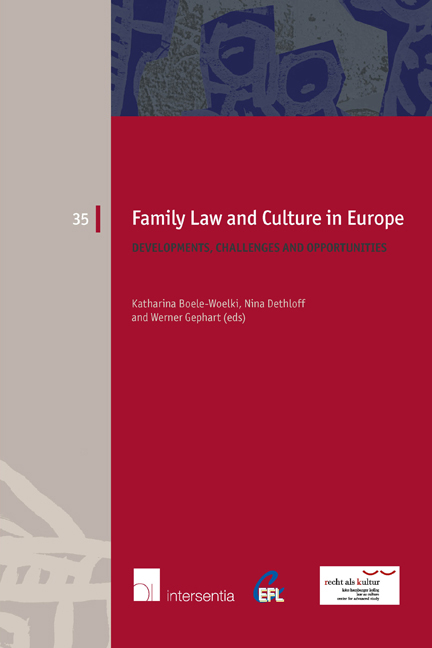Book contents
- Frontmatter
- Preface
- Contents
- List of Authors
- PART ONE THE CEFL PRINCIPLES ON PROPERTY RELATIONS BETWEEN SPOUSES
- General Rights and Duties in the CEFL Principles on Property Relations between Spouses
- Marital Property Agreements
- The Participation in Acquisitions Regime
- The Community of Acquisitions Regime
- PART TWO BREAKUP OF (NON-)FORMALISED RELATIONSHIPS
- PART THREE NEW CONCEPTS OF PARENTAGE
- PART FOUR INTERNATIONAL FAMILY RELATIONSHIPS
- PART FIVE TRANSNATIONAL FAMILIES: ACROSS NATIONS AND CULTURES
- EUROPEAN FAMILY LAW SERIES
Marital Property Agreements
from PART ONE - THE CEFL PRINCIPLES ON PROPERTY RELATIONS BETWEEN SPOUSES
Published online by Cambridge University Press: 22 November 2017
- Frontmatter
- Preface
- Contents
- List of Authors
- PART ONE THE CEFL PRINCIPLES ON PROPERTY RELATIONS BETWEEN SPOUSES
- General Rights and Duties in the CEFL Principles on Property Relations between Spouses
- Marital Property Agreements
- The Participation in Acquisitions Regime
- The Community of Acquisitions Regime
- PART TWO BREAKUP OF (NON-)FORMALISED RELATIONSHIPS
- PART THREE NEW CONCEPTS OF PARENTAGE
- PART FOUR INTERNATIONAL FAMILY RELATIONSHIPS
- PART FIVE TRANSNATIONAL FAMILIES: ACROSS NATIONS AND CULTURES
- EUROPEAN FAMILY LAW SERIES
Summary
INTRODUCTION
Chapter II of the CEFL's Principles of European Family Law Regarding Property Relations Between Spouses deals with what is entitled ‘Marital Property Agreements’ by which is broadly meant agreements made before or during the marriage determining the spouses’ property relationship. Insofar as statistics are available, the evidence is that the number of such agreements has become more frequent.
SOME BASIC DILEMMAS
In drawing up these Principles it was sought, on the one hand, to promote spousal autonomy and, on the other, to balance the freedom to make agreements with the need to give fair protection to each spouse and to third parties. Spousal autonomy has been a guiding philosophy underlying all the CEFL's Principles, as can be seen in its Divorce Principles, whichessentially promoted divorce by consent with little or no State interference depending on whether there are children under the age of 16 and, more particularly, in its Maintenance Principles, according to Principle 2:10 of which, spouses are permitted to make maintenance agreements again subject to minimal State scrutiny. But unbridled freedom to make marital property agreements could lead to injustice and the CEFL has sought to balance that freedom against the important general purpose of matrimonial property law to grant each spouse the right to obtain a fair share in the property of the other and to give fair protection to third parties against fraudulent manoeuvres.
To achieve this balancing act, the Property Principles provide in the first instance for the basic freedom to make martial property agreements but nevertheless require such agreements to conform to certain conditions as to form and disclosure. The Principles also prescribe the obligations of notaries or other persons with comparable functions; set out the effects of such agreements against third parties and, consistently with other Principles on distribution (that is Principles 4:32 and 4:57) and Principle 2:6 of the Maintenance Principles, empower a competent authority to set aside or adjust the agreement in cases of exceptional hardship.
- Type
- Chapter
- Information
- Family Law and Culture in EuropeDevelopments, Challenges and Opportunities, pp. 13 - 24Publisher: IntersentiaPrint publication year: 2014

